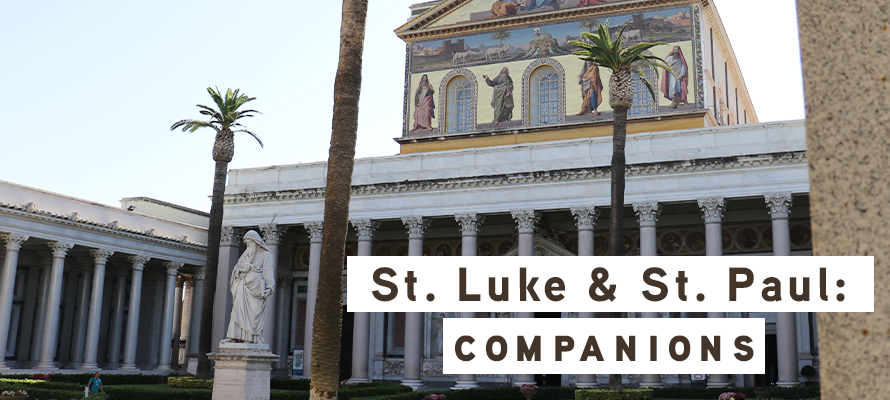
When you visit a locale with extraordinary significance in salvation history, it's good to have Scripture close at hand. When my family visited Rome a few years ago, it was Scripture coupled with history that really hit home the richness and depth of our Faith.
On our trip, one of the places we visited was the Basilica of St. Paul Outside the Walls. Inside are portraits of every pope, and outside there's a central statue of St. Paul accompanied by only one other statue – that of St. Luke off toward the south. This is meant to represent Paul's statement in 2 Timothy 4:11, “Luke alone is with me.”
Paul was adamant about living a righteous life in accord with the laws of the God of Israel. Except, as he discovered through a vivid and startling vision of Christ while en route to Damascus, he could not simultaneously be serving the one true God and persecuting Jesus Christ because Jesus is God. Attributed to Paul are a slew of letters found in the New Testament including letters to the Romans, the Corinthians, and the Philippians among others.
According to the historian Eusebius, Luke the Evangelist was born at Antioch in Syria. An early convert to Christianity, Luke eventually found himself at Paul's side, aiding him in his far-flung travels to spread the Word of God to all peoples. He himself proved to be a keen writer and was (no big surprise) the author of the Gospel according to Luke.
It's not too far of a stretch to conclude that Luke – a physician – and Paul – a man who had been taught in a notable school at Jerusalem – were more educated than some of their contemporaries such as St. Peter, the fisherman who was appointed by Christ as the first pope. As they were both men of learning and of passionate faith, it's not hard to imagine the two becoming close friends.
It's also likely that Luke, who was a Gentile, appreciated the fact that Paul, who had previously spent his energies vehemently opposing Christendom in the belief that he was defending Judaism, now devoted himself to preaching the Gospel of Christ to the Gentiles.
The 2018 film Paul, Apostle of Christ does a good job at getting across onscreen the dynamic relationship between these two famed evangelists. James Faulkner plays Paul, while the role of Luke is filled by none other than Jim Caviezel, the Catholic actor who portrayed Jesus in Mel Gibson's renowned The Passion of the Christ. Because of Caviezel's notoriety among faithful moviegoers, Luke's character was perhaps overplayed – offering a familiar face to a man who lived hundreds of years ago.
Luke's part in the story of St. Paul is, as can already be seen, not at all insignificant. It's traditionally suggested that St. Luke is the author of the Acts of the Apostles in addition to being behind the gospel account bearing his name. The origins of both documents are traced back to circa 75 AD, and much of Luke's writing offers up examples of his familiarity with Paul. In fact, Luke didn't just join Paul the Apostle for his Gospel-spreading ventures. He even joined Paul during his imprisonment at the hands of Caesarean and Roman authorities.
The movie Paul, Apostle of Christ captures several key aspects of the historical knowledge of these evangelists. It shows how genuine Luke was, how good of a friend he became with Paul as he sits comforting the man who once hunted down Christians. It sheds light on their camaraderie, and it brings Luke's medical background to our attention when he examines the Roman prefect's sick daughter.
The love of Christ shared between Luke and Paul offers us a prime example of Christian fellowship and of growing in our faith through community. Here were two men who often found themselves living out Christ's promise regarding faithful community: “For where two or three are gathered in my name, there I am in the midst of them” (Matthew 18:20). The friendship between the two of them, especially this traditional image of the two talking to each other in a cell, serves as a microcosm for all of Christian interpersonal unity and communion.
Certainly, Luke was a comfort to Paul on many occasions, particularly in his captivity. St. Luke, whose feast we celebrate on October 18th, gives us an example of being present for others, dedicating time to community rather than selfish interests, and being diligent in our work. St. Luke the Evangelist, pray for us!




